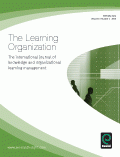Cornelissen, F., De Jong, T., & Kessels, J. (2012). Knitted patterns or contagious hotspots? The Learning Organization Vol. 19 No. 6, 469-481

Knitted patterns or contagious hotspots? Linking views on knowledge and organizational networked learning
Abstract
Purpose – This paper aims to propose a framework which connects perspectives on knowledge and learning to various approaches of social networks studies. The purpose is twofold: providing input for the discourse in organizational studies about the way different views on knowledge and networks drive design choices and activities of researchers, policy makers, and practitioners; providing relevant questions which can support researchers, (human resource) managers, policy makers and practitioners to reflect on their views and their endeavors to study, understand and facilitate knowledge and learning processes in organizational networks.
Design/methodology/approach – In exploring the conceptual connections the authors draw on distinctions made between views on knowledge and networked learning in the fields of organizational development, human resource development and social networks. The proposed framework is built from connections identified in the literature review.
Findings – The paper proposes a framework which identifies four different ways of studying and understanding the outcomes of learning and knowledge processes in organizational networks.
Practical implications – The framework supports researchers, policy makers, (human resource) managers and practitioners in their endeavor to study, understand and facilitate the relationship between knowledge, learning, networks and their outcomes. The four perspectives can be used in designing and evaluating interventions and policy which are intended to foster knowledge processes and learning in organizations.
Originality/value – Studies on knowledge processes and learning in organisational networks are increasingly based on a variety of knowledge theories, which are not always based on a clear academic synthesis. Often these views of knowledge remain implicit and do not fit approaches adopted for understanding or evaluating knowledge processes and learning in organisations. This paper proposes a framework which integrates different concepts of knowledge and approaches to network studies.
